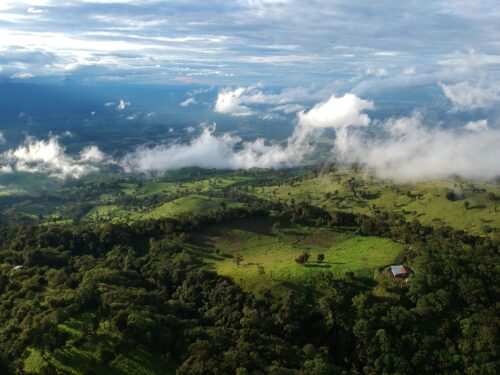by Giacomo Sebis
On 26 January 2024, the Constitutional Chamber of the Supreme Court of Costa Rica ruled the government to publish climate-related information. The proceedings were based on a complaint by twelve civil society organisations, which submitted a request for information to the government on 21/09/2023. With the successful outcome of this case, another climate lawsuit in Latin America has now made a contribution to improved climate adaptation.
I. What are climate lawsuits?
Climate lawsuits are legal proceedings aimed at holding states and companies accountable for climate-related damage and failure to adapt to climate change. A UNEP report [1] identified a total of 2,180 such proceedings in 65 different jurisdictions in 2022. Most of the plaintiffs are citizens or non-governmental organisations. The main aim of these lawsuits is to set out the specific climate protection-related obligations of states or companies and to demonstrate the shortcomings of the measures taken to date. The plaintiffs make innovative use of legal argumentation patterns and legal leeway to draw the attention of states and companies to their climate protection obligations. In recent years, these proceedings have become increasingly important for effective climate protection.
II. What was decided in Costa Rica?
In the judgement obtained before the Costa Rican Supreme Court, the right to access government climate-related information was strengthened. On 21/09/2023, an initiative consisting of twelve youth and sustainability organisations submitted a request to the Costa Rican Ministry of Environment and Energy to obtain climate-related data. The aim of this data is to make Costa Rica’s compliance with its national commitments under the Paris Agreement more transparent [2]. The following sectors were affected by the request: Mobility and transport, development and spatial planning, energy, forests and biodiversity, oceans, water resources, climate action, finance and strategic policies and plans.
The Costa Rican government initially refused to hand over the information. The organisations therefore took legal action by submitting a request to the Constitutional Chamber of the Costa Rican Supreme Court on 22/11/2023. As a result, the Costa Rican Ministry of the Environment sent the requested information to the organisations on 13/12/2023. The Constitutional Chamber of the Supreme Court finally ruled on 26 January 2024 and, although information had already been provided, the court confirmed the government’s obligation to release the information. Although the data provided was incomplete [3], the judgement represents an important development. Transparency in matters of climate protection is moving more into focus and can serve as a template for further proceedings (in Costa Rica and beyond).
III. What trends can be expected in Latin America in the future?
In the Latin American context of climate lawsuits, two significant developments are foreseeable in the coming years.
The ‘Saúl v. RWE’ [4] proceedings are particularly noteworthy. In these proceedings, the Peruvian farmer Saúl Luciano Lliuya is suing the German energy company RWE in German courts. After his lawsuit filed at Essen Regional Court in 2015 was dismissed, he lodged an appeal. The proceedings are therefore currently pending at the Higher Regional Court of Hamm. There he is trying to oblige the energy company to improve climate protection. The background to this is that his home village is located near a mountainside and is potentially at risk of being hit by a flood wave in the future. Increasing glacier melt, which is being accelerated by climate change, is thought to be the cause. RWE is one of Europe’s largest greenhouse gas emitters. In the proceedings, the plaintiff wants to hold the company accountable for its share of the dangers threatening its livelihood. After the admissibility of the lawsuit was affirmed in 2017, the court began taking evidence. In 2022, a site visit to the plaintiff’s home village took place in this context. The first expert opinion is currently available and the proceedings are continuing.
In addition to climate litigation as described above, some international courts also deal with international climate protection in other ways. One method used is the preparation of an advisory opinion. An advisory opinion is an expert opinion prepared by a court to clarify a specific legal issue. However, the court itself does not decide on a case, but merely provides advice. This option is offered by the statutes of several international courts. The Inter-American Court of Justice in San José is also currently working on an advisory opinion. This deals with the human rights aspects of the climate crisis [5]. After receiving the request to prepare this advisory opinion at the beginning of 2023, numerous statements from state and non-state actors were submitted to the Inter-American Court by November 2023. Initial hearings were also held at the end of April 2024. It is expected that the process will soon provide extremely important impetus for the legal link between human rights and the climate crisis.
[1] See: https://www.unep.org/resources/report/global-climate-litigation-report-2023-status-review (last accessed: 09.06.2024).
[2] See: https://larutadelclima.org/wp-content/uploads/2024/02/58959-comunicado-de-prensa-.pdf (last accessed: 09.06.2024).
[3] See: https://delfino.cr/2024/03/organizaciones-senalan-falta-de-transparencia-del-gobierno-en-materia-ambiental (last accessed: 09.06.2024).
[4] See: https://rwe.climatecase.org/de (last accessed: 09.06.2024).
[5] See: https://climatecasechart.com/non-us-case/request-for-an-advisory-opinion-on-the-scope-of-the-state-obligations-for-responding-to-the-climate-emergency/ (last accessed: 09.06.2024).

